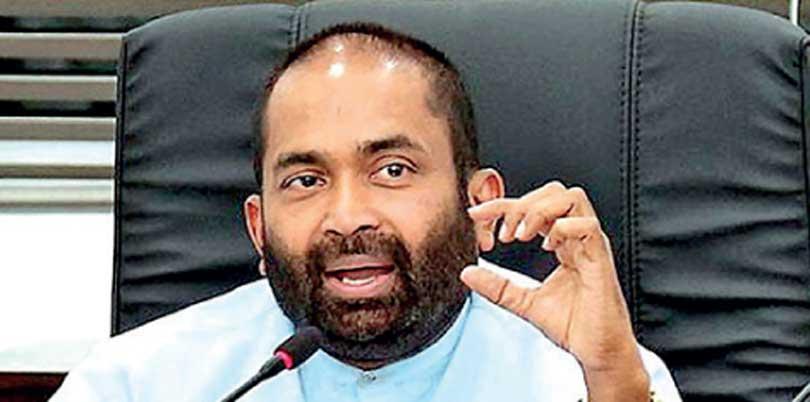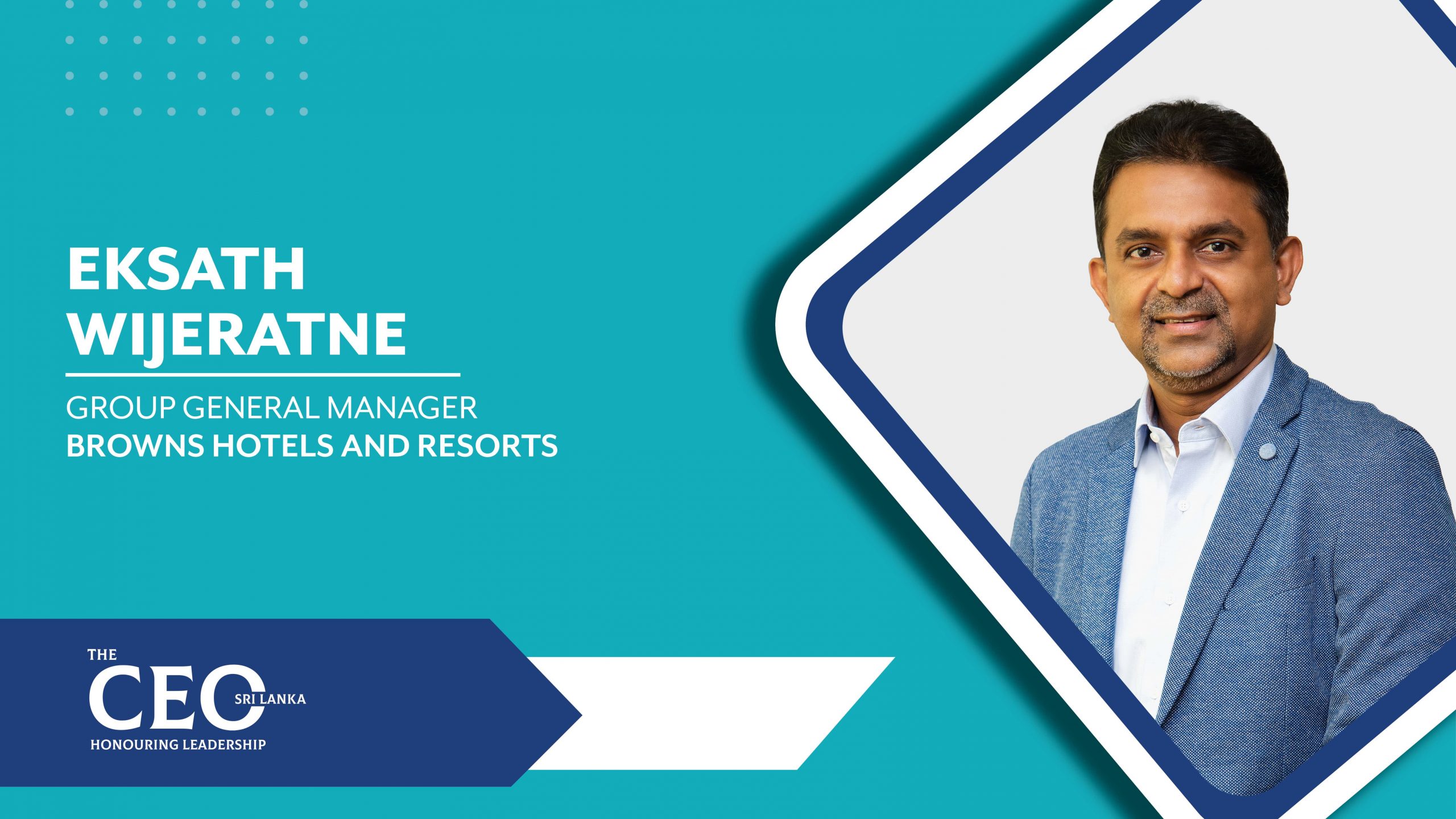“Resentment is like drinking poison and then hoping it will kill your enemies,” – Nelson Mandela. During his long life, Mandela inspired countless individuals. One such individual is Eksath Wijeratne, Group General Manager of Browns Hotels and Resorts, who continues to be personified by the icon’s spirit.
In context, hospitality is not just one of the world’s biggest industries; it’s also one of the most dynamic, exciting and fast-growing. Consequently, Eksath’s career in the sector began over thirty years ago. He is currently a member of the Sri Lanka Institute of Tourism and Hotel Management’s Board of Directors. In addition, he has previously held the position of President of the Ceylon Hotel School Graduates Association and Vice President of the Bentota-Beruwala Hoteliers Association. He is also a certified SATS trainer in Hotel Operations; this is his way of giving back to the industry by encouraging and promoting the professional careers of Sri Lanka’s young and aspiring hoteliers.
In terms of chronology, Browns Hotels & Resorts is a subsidiary of LOLC Group that entered the hospitality industry following the end of the civil war in 2010. The business’s initial hospitality acquisition was a chain of hotels in the south. It expanded to other consequential sites on the island and then ventured into international accessions, including Mauritius and the Maldives. They have worked with multinational hotel operators such as Sheraton, Barcelo, and Radisson to manage several of its hotels as one of the leading hotel chains in Sri Lanka. The Company intends to augment its management portfolio locally and internationally.
With the latest hotel ventures, Browns recently acquired Serendib Leisure Management, giving them a total room inventory of over 1700. Club Hotel Dolphin, Hotel Sigiriya, The Calm Resort & Spa, Dickwella Resort & Spa, and Avani Bentota Resort are also part of the hotel chain. Lantern Boutique Hotel – Mirissa, Ubuntu Beach Properties – Mirissa, The Beach House – Mirissa, and The Lavender House – Pussellawa are among the villas they manage. The international brands operated by the group are, Occidental Eden Beruwala, Occidental Paradise Dambulla, Radisson Blu in Mauritius, and Sheraton Kosgoda Turtle Beach Resort as affiliate hotels. They also have two large projects in the works: a 365-room facility in Beruwala and a 5-hotel project in the Maldives.
When asked what hotel sectors they presently manage and the predicaments Eksath sees in each/some of these segments, he remarked that they currently operate Resorts, City Hotels, Condominiums, Restaurants, Boutique Hotels, and Villas both locally and internationally. In addition, he noted that rising operating costs had become the most significant issue in today’s company. At the same time, insufficient tourist-friendly regulations and policies in comparison to other Asian locations put even more strain on the tourism industry’s long-term viability. While each section faces its own set of hurdles, as Eksath points out, a few of the most compelling obstacles is the local tourism policy and the overall infrastructure developments such as local air traffic system, sea cruising, nightlife and community’s attitude toward hoteliers, which derives from the Sri Lankan culture. He persisted, “It is our responsibility to ensure that all stakeholders trust us, as the synergy of all stakeholders helps us to meet the international standards of hospitality.” Since most of their resorts are located in villages, he stated that as responsible entities, they first build a strong relationship with local religious establishments, tourism authorities, multi-cultural associates, and other stakeholders to educate them of the positive inspirations of hoteliers and hospitality.
The COVID-19 pandemic has indelibly affected the travel industry. Until recently, it suffered severely. Spending on tourism isn’t likely to return to pre-crisis levels until 2024. But though the long-term effects may appear overwhelming, industry leaders are finding that many lessons from the COVID-19 crisis could help hotel chains come back stronger than they were before the pandemic. As COVID-19 concerns begin to subside, a silver lining emerges: travel is the second-most-desired activity among respondents, behind dining out. Hotel reservations and airline bookings are on a significant rebound. In Eksath’s assertion, as a hotel operator in Sri Lanka, they have faced numerous muddles, including the 30-year civil war, the 2004 Tsunami disaster, Easter Attacks in 2019, the Covid-19 pandemic, and a variety of other limitations. Consequently, they are acclimated to and fully equipped to prepare for any problems thrown their way by applying what they have learned in the past. For example, when faced with a global pandemic, their first reaction was to defend their business by reducing losses and safeguarding their staff. Seeing that the pandemic was expected to last indefinitely, their first idea was to assist the government and local authorities by offering their hotel facilities to help stop the virus from spreading. Moreover, the hotels were turned into quarantine facilities and made available to returnees for free before permitting paid quarantine facilities. Eksath is pleased that they could keep many of their employees and maintain their facilities to a large extent. Later, at the height of the pandemic, they volunteered their facilities as Intermediate Care Centres to assist the health system.
Foreseeing, the company is distinctly riveted in extending Brown’s portfolio in the Maldives, as it is a sought-after tourist destination for international visitors, with a more hefty footfall and thus a faster return on investment. Their primary emphasis in Sri Lanka is a 365-room hotel project in Beruwala, which they hope to open within the next two years. Barring, they are in discourse with several foreign hotel brands about taking over the management of this brand-new property. Forbye, the company is considering increasing their villa portfolio considering they just launched a bungalow in Pussellawa and are currently working on two villas in Yala and Trincomalee, which they expect to build by the end of 2022.
Recapitulating, Eksath credits that while many people emanate as leaders when things are going well, those who grab the reins of leadership to turn adversity into success ultimately become great leaders. “Leaders must be resilient to adapt to conditions, make timely judgments, and stand by those decisions. So, if the decision is erroneous, have the fortitude to admit it and move on”, in his words, “Understand your team’s specific talents and weaknesses, and leave your personal preferences and dislikes at bay; instead, treat each member as a professional.”


